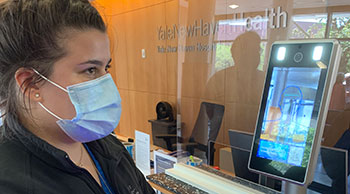
Popular Locations
- Yale New Haven Children's Hospital
- Yale New Haven Hospital - York Street Campus
- Yale New Haven Hospital - Saint Raphael Campus


Bryanna Lopes, RN, Orthopedic Surgery (EP 7-7), recently checked the walk-through temperature scanner in the York Street Campus main entrance. The scanners, in use throughout YNHHS, are part of a screening process for patients entering the hospitals.
As patient volume approaches pre-COVID levels in several areas, Yale New Haven Health continues to focus on increasing patients’ access to care, retooling its budget and supporting strategic future growth.
YNHHS staff and physicians are continuing their extraordinary efforts to safely provide a full range of clinical services to all patients who need them. At Yale New Haven Hospital, patient volume for ambulatory, procedural, diagnostic imaging and laboratory services began to come back in July, and ambulatory locations saw consistent increases in face-to-face visits.
To enhance patient, visitor and staff safety, YNHHS is piloting new technologies such as walk-through temperature scanners and virtual patient rooming. Screening questionnaires are updated regularly to reflect changes in travel advisories and visitor policies, and social distancing performance is being closely monitored.
Teams throughout Yale New Haven Health continue to increase COVID-19 testing by using multiple testing platforms and partnering with external labs. The first week of August, YNHHS laboratories performed almost 16,000 COVID tests, with 97 percent yielding results within 24 hours. YNHHS is also developing a process for “pooled testing,” which can save testing materials that are in short supply. With pooled testing, several people provide specimens; the lab takes a sample from each specimen and performs one test on the combined samples. If the test is negative, no further testing is needed. If it’s positive, each individual specimen is tested to determine who is infected.
While efforts to increase testing, access to services and patient volume are succeeding, health system leaders do not expect volume to return to pre-COVID levels for the 2021 fiscal year, which begins Oct. 1.
To prepare, they are developing a 2021 budget scenario that anticipates YNHHS will see 90 percent of its pre-COVID volume. Under that scenario, that 10 percent volume reduction translates into about $500 million in lost revenue.
The anticipated decrease in volume, combined with the substantial cost of treating more than 4,000 COVID-19 patients between March and late July, mean that for the first time in more than 40 years, YNHHS will lose money, in spite of federal assistance.
“To break even in fiscal year 2021, we will need to find hundreds of millions in savings and new revenue,” said YNHHS CEO Marna Borgstrom. “Consistent with our value that employees are our greatest asset, we hope to find these savings while avoiding layoffs and/or furloughs.”
As part of the upcoming year budget planning, YNHHS will substantially reduce capital spending, which covers items such as renovations and equipment; freeze all non-essential replacement positions/new hires and limit promotions; eliminate wage increases for executive leadership for the coming year; and significantly limit discretionary spending on items such as work-related travel, catering and professional dues.
Adding or expanding services might seem counterintuitive during challenging financial times, but moving forward with critically important initiatives and continuing to invest in certain programs and projects will ultimately enhance patients’ access to care and increase volume and revenue. For example, Yale New Haven Hospital will continue pursuing its new neuroscience center at the Saint Raphael Campus, but is spreading construction – and cost – over several years.
“We know the coming year will be challenging,” Borgstrom said. “But we have hardworking, creative people in the health system whose commitment to our patients and our mission will help us emerge from this challenging period even stronger.”